Entrepreneurship and Small Business Management Report, HND
VerifiedAdded on 2023/01/03
|16
|4814
|38
Report
AI Summary
This report provides a comprehensive overview of entrepreneurship and small business management. It begins by defining entrepreneurship and examining various types of entrepreneurial ventures, including small business entrepreneurs, social entrepreneurs, innovative entrepreneurs, and imitator entrepreneurs, highlighting their similarities and differences. The report then delves into the impact of micro and small businesses on the economy, presenting relevant data and statistics. It emphasizes the importance of startups in fostering the growth of the social economy, particularly in terms of job creation and innovation. The analysis continues by exploring the characteristics, skills, and traits of successful entrepreneurs, contrasting them with traditional business managers. The report further examines the entrepreneurial personality, mindset, and motivations, as well as how background and experience can influence entrepreneurs. The report concludes with a summary of the key findings and insights, referencing sources to support the analysis.

Entrepreneurship and
small businesses
small businesses
Paraphrase This Document
Need a fresh take? Get an instant paraphrase of this document with our AI Paraphraser
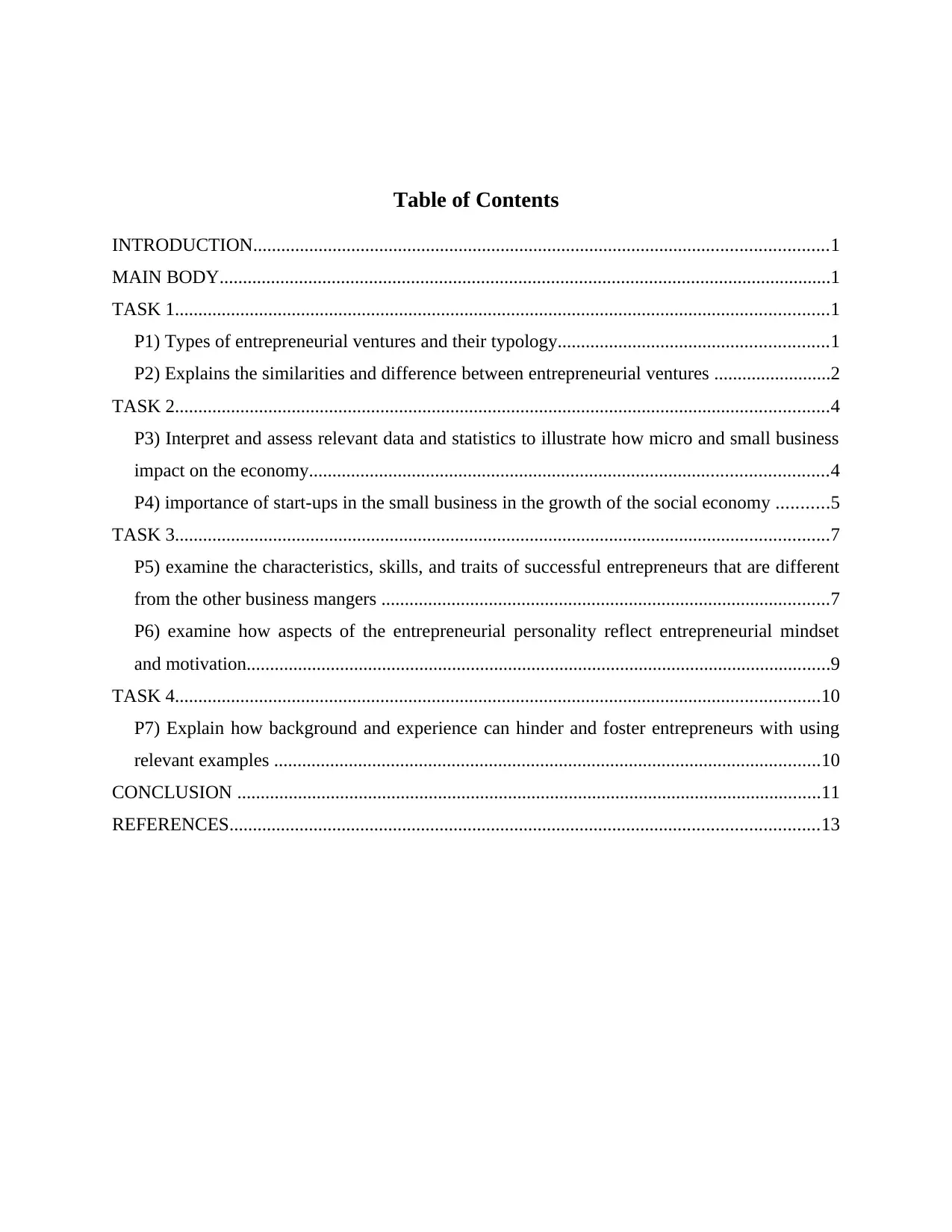
Table of Contents
INTRODUCTION...........................................................................................................................1
MAIN BODY...................................................................................................................................1
TASK 1............................................................................................................................................1
P1) Types of entrepreneurial ventures and their typology..........................................................1
P2) Explains the similarities and difference between entrepreneurial ventures .........................2
TASK 2............................................................................................................................................4
P3) Interpret and assess relevant data and statistics to illustrate how micro and small business
impact on the economy...............................................................................................................4
P4) importance of start-ups in the small business in the growth of the social economy ...........5
TASK 3............................................................................................................................................7
P5) examine the characteristics, skills, and traits of successful entrepreneurs that are different
from the other business mangers ................................................................................................7
P6) examine how aspects of the entrepreneurial personality reflect entrepreneurial mindset
and motivation.............................................................................................................................9
TASK 4..........................................................................................................................................10
P7) Explain how background and experience can hinder and foster entrepreneurs with using
relevant examples .....................................................................................................................10
CONCLUSION .............................................................................................................................11
REFERENCES..............................................................................................................................13
INTRODUCTION...........................................................................................................................1
MAIN BODY...................................................................................................................................1
TASK 1............................................................................................................................................1
P1) Types of entrepreneurial ventures and their typology..........................................................1
P2) Explains the similarities and difference between entrepreneurial ventures .........................2
TASK 2............................................................................................................................................4
P3) Interpret and assess relevant data and statistics to illustrate how micro and small business
impact on the economy...............................................................................................................4
P4) importance of start-ups in the small business in the growth of the social economy ...........5
TASK 3............................................................................................................................................7
P5) examine the characteristics, skills, and traits of successful entrepreneurs that are different
from the other business mangers ................................................................................................7
P6) examine how aspects of the entrepreneurial personality reflect entrepreneurial mindset
and motivation.............................................................................................................................9
TASK 4..........................................................................................................................................10
P7) Explain how background and experience can hinder and foster entrepreneurs with using
relevant examples .....................................................................................................................10
CONCLUSION .............................................................................................................................11
REFERENCES..............................................................................................................................13
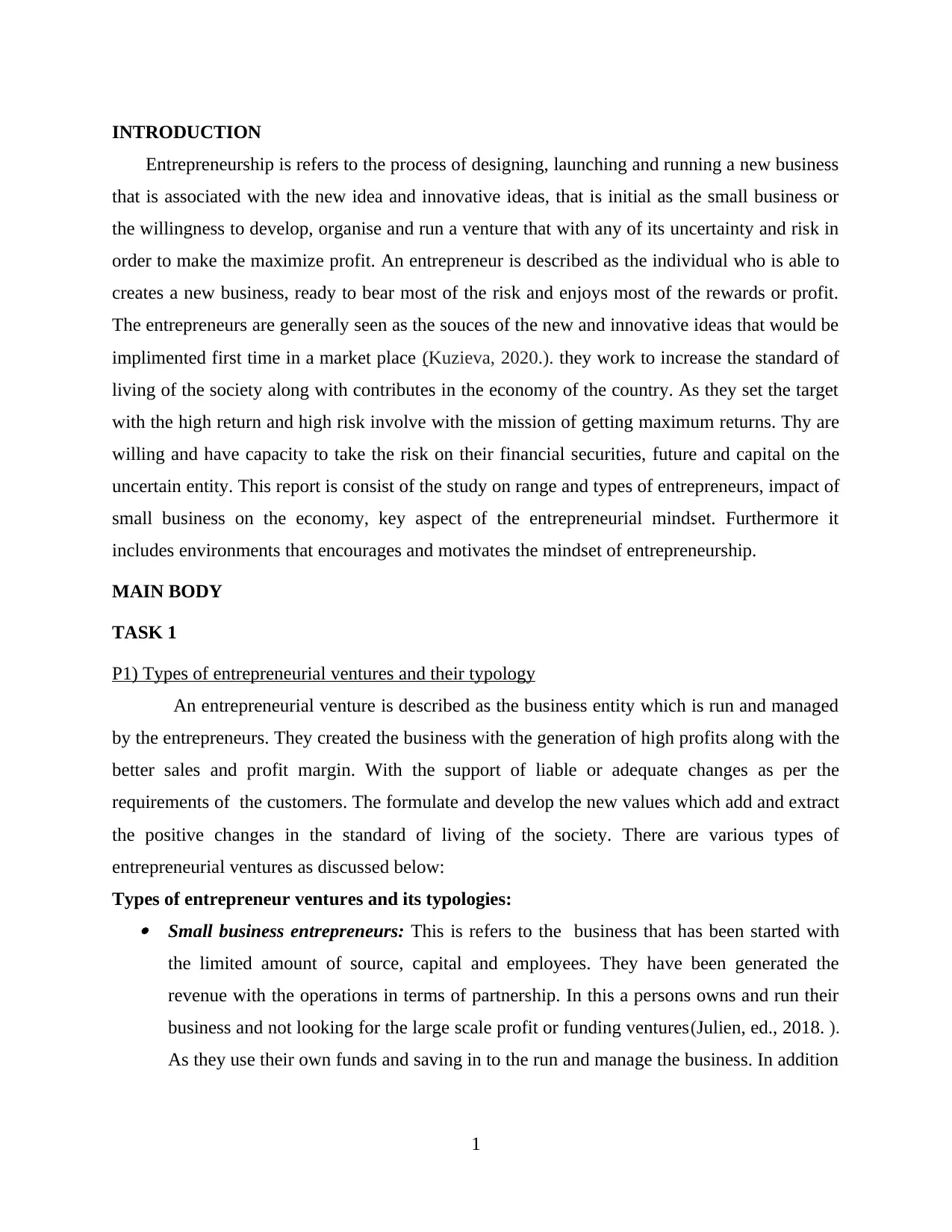
INTRODUCTION
Entrepreneurship is refers to the process of designing, launching and running a new business
that is associated with the new idea and innovative ideas, that is initial as the small business or
the willingness to develop, organise and run a venture that with any of its uncertainty and risk in
order to make the maximize profit. An entrepreneur is described as the individual who is able to
creates a new business, ready to bear most of the risk and enjoys most of the rewards or profit.
The entrepreneurs are generally seen as the souces of the new and innovative ideas that would be
implimented first time in a market place (Kuzieva, 2020.). they work to increase the standard of
living of the society along with contributes in the economy of the country. As they set the target
with the high return and high risk involve with the mission of getting maximum returns. Thy are
willing and have capacity to take the risk on their financial securities, future and capital on the
uncertain entity. This report is consist of the study on range and types of entrepreneurs, impact of
small business on the economy, key aspect of the entrepreneurial mindset. Furthermore it
includes environments that encourages and motivates the mindset of entrepreneurship.
MAIN BODY
TASK 1
P1) Types of entrepreneurial ventures and their typology
An entrepreneurial venture is described as the business entity which is run and managed
by the entrepreneurs. They created the business with the generation of high profits along with the
better sales and profit margin. With the support of liable or adequate changes as per the
requirements of the customers. The formulate and develop the new values which add and extract
the positive changes in the standard of living of the society. There are various types of
entrepreneurial ventures as discussed below:
Types of entrepreneur ventures and its typologies: Small business entrepreneurs: This is refers to the business that has been started with
the limited amount of source, capital and employees. They have been generated the
revenue with the operations in terms of partnership. In this a persons owns and run their
business and not looking for the large scale profit or funding ventures(Julien, ed., 2018. ).
As they use their own funds and saving in to the run and manage the business. In addition
1
Entrepreneurship is refers to the process of designing, launching and running a new business
that is associated with the new idea and innovative ideas, that is initial as the small business or
the willingness to develop, organise and run a venture that with any of its uncertainty and risk in
order to make the maximize profit. An entrepreneur is described as the individual who is able to
creates a new business, ready to bear most of the risk and enjoys most of the rewards or profit.
The entrepreneurs are generally seen as the souces of the new and innovative ideas that would be
implimented first time in a market place (Kuzieva, 2020.). they work to increase the standard of
living of the society along with contributes in the economy of the country. As they set the target
with the high return and high risk involve with the mission of getting maximum returns. Thy are
willing and have capacity to take the risk on their financial securities, future and capital on the
uncertain entity. This report is consist of the study on range and types of entrepreneurs, impact of
small business on the economy, key aspect of the entrepreneurial mindset. Furthermore it
includes environments that encourages and motivates the mindset of entrepreneurship.
MAIN BODY
TASK 1
P1) Types of entrepreneurial ventures and their typology
An entrepreneurial venture is described as the business entity which is run and managed
by the entrepreneurs. They created the business with the generation of high profits along with the
better sales and profit margin. With the support of liable or adequate changes as per the
requirements of the customers. The formulate and develop the new values which add and extract
the positive changes in the standard of living of the society. There are various types of
entrepreneurial ventures as discussed below:
Types of entrepreneur ventures and its typologies: Small business entrepreneurs: This is refers to the business that has been started with
the limited amount of source, capital and employees. They have been generated the
revenue with the operations in terms of partnership. In this a persons owns and run their
business and not looking for the large scale profit or funding ventures(Julien, ed., 2018. ).
As they use their own funds and saving in to the run and manage the business. In addition
1
⊘ This is a preview!⊘
Do you want full access?
Subscribe today to unlock all pages.

Trusted by 1+ million students worldwide
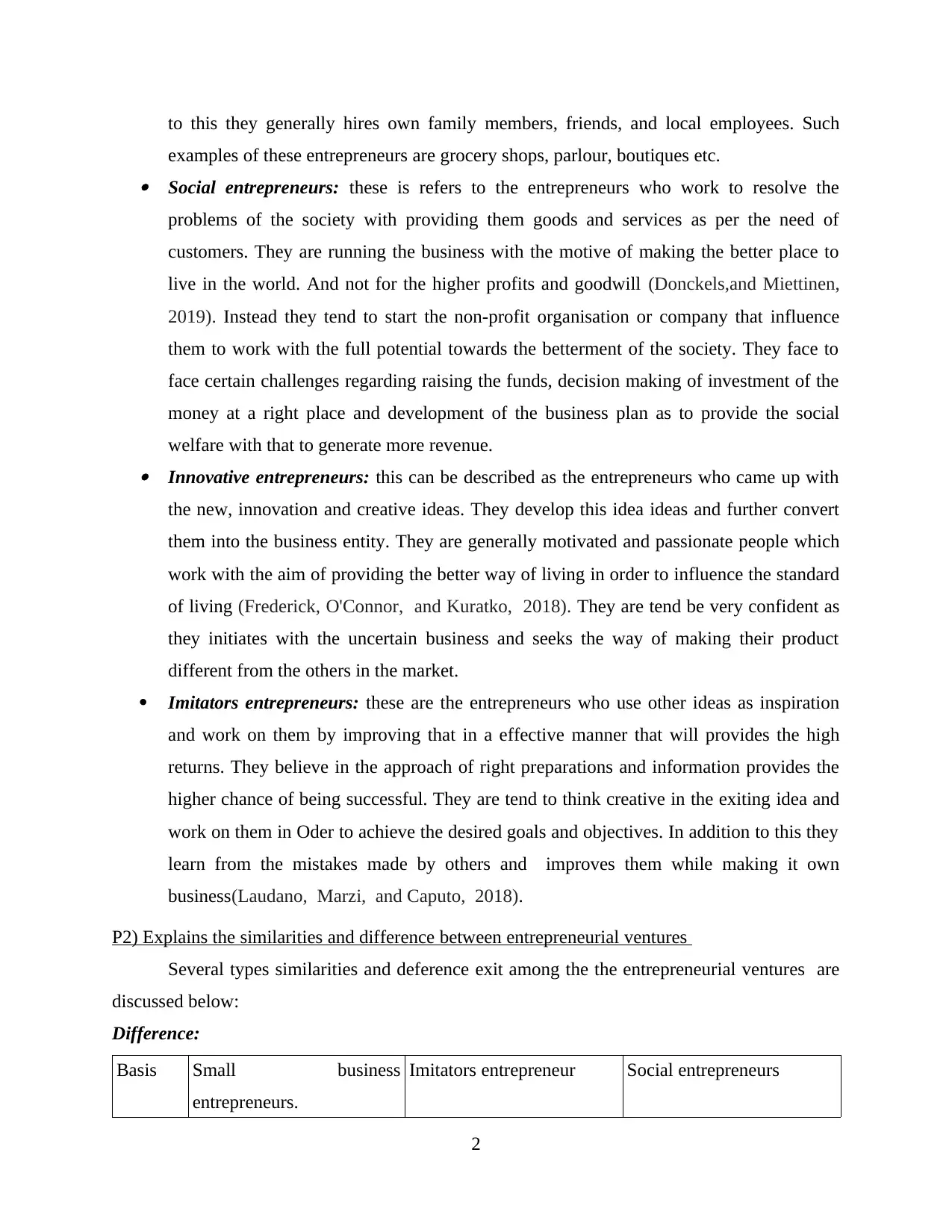
to this they generally hires own family members, friends, and local employees. Such
examples of these entrepreneurs are grocery shops, parlour, boutiques etc. Social entrepreneurs: these is refers to the entrepreneurs who work to resolve the
problems of the society with providing them goods and services as per the need of
customers. They are running the business with the motive of making the better place to
live in the world. And not for the higher profits and goodwill (Donckels,and Miettinen,
2019). Instead they tend to start the non-profit organisation or company that influence
them to work with the full potential towards the betterment of the society. They face to
face certain challenges regarding raising the funds, decision making of investment of the
money at a right place and development of the business plan as to provide the social
welfare with that to generate more revenue. Innovative entrepreneurs: this can be described as the entrepreneurs who came up with
the new, innovation and creative ideas. They develop this idea ideas and further convert
them into the business entity. They are generally motivated and passionate people which
work with the aim of providing the better way of living in order to influence the standard
of living (Frederick, O'Connor, and Kuratko, 2018). They are tend be very confident as
they initiates with the uncertain business and seeks the way of making their product
different from the others in the market.
Imitators entrepreneurs: these are the entrepreneurs who use other ideas as inspiration
and work on them by improving that in a effective manner that will provides the high
returns. They believe in the approach of right preparations and information provides the
higher chance of being successful. They are tend to think creative in the exiting idea and
work on them in Oder to achieve the desired goals and objectives. In addition to this they
learn from the mistakes made by others and improves them while making it own
business(Laudano, Marzi, and Caputo, 2018).
P2) Explains the similarities and difference between entrepreneurial ventures
Several types similarities and deference exit among the the entrepreneurial ventures are
discussed below:
Difference:
Basis Small business
entrepreneurs.
Imitators entrepreneur Social entrepreneurs
2
examples of these entrepreneurs are grocery shops, parlour, boutiques etc. Social entrepreneurs: these is refers to the entrepreneurs who work to resolve the
problems of the society with providing them goods and services as per the need of
customers. They are running the business with the motive of making the better place to
live in the world. And not for the higher profits and goodwill (Donckels,and Miettinen,
2019). Instead they tend to start the non-profit organisation or company that influence
them to work with the full potential towards the betterment of the society. They face to
face certain challenges regarding raising the funds, decision making of investment of the
money at a right place and development of the business plan as to provide the social
welfare with that to generate more revenue. Innovative entrepreneurs: this can be described as the entrepreneurs who came up with
the new, innovation and creative ideas. They develop this idea ideas and further convert
them into the business entity. They are generally motivated and passionate people which
work with the aim of providing the better way of living in order to influence the standard
of living (Frederick, O'Connor, and Kuratko, 2018). They are tend be very confident as
they initiates with the uncertain business and seeks the way of making their product
different from the others in the market.
Imitators entrepreneurs: these are the entrepreneurs who use other ideas as inspiration
and work on them by improving that in a effective manner that will provides the high
returns. They believe in the approach of right preparations and information provides the
higher chance of being successful. They are tend to think creative in the exiting idea and
work on them in Oder to achieve the desired goals and objectives. In addition to this they
learn from the mistakes made by others and improves them while making it own
business(Laudano, Marzi, and Caputo, 2018).
P2) Explains the similarities and difference between entrepreneurial ventures
Several types similarities and deference exit among the the entrepreneurial ventures are
discussed below:
Difference:
Basis Small business
entrepreneurs.
Imitators entrepreneur Social entrepreneurs
2
Paraphrase This Document
Need a fresh take? Get an instant paraphrase of this document with our AI Paraphraser
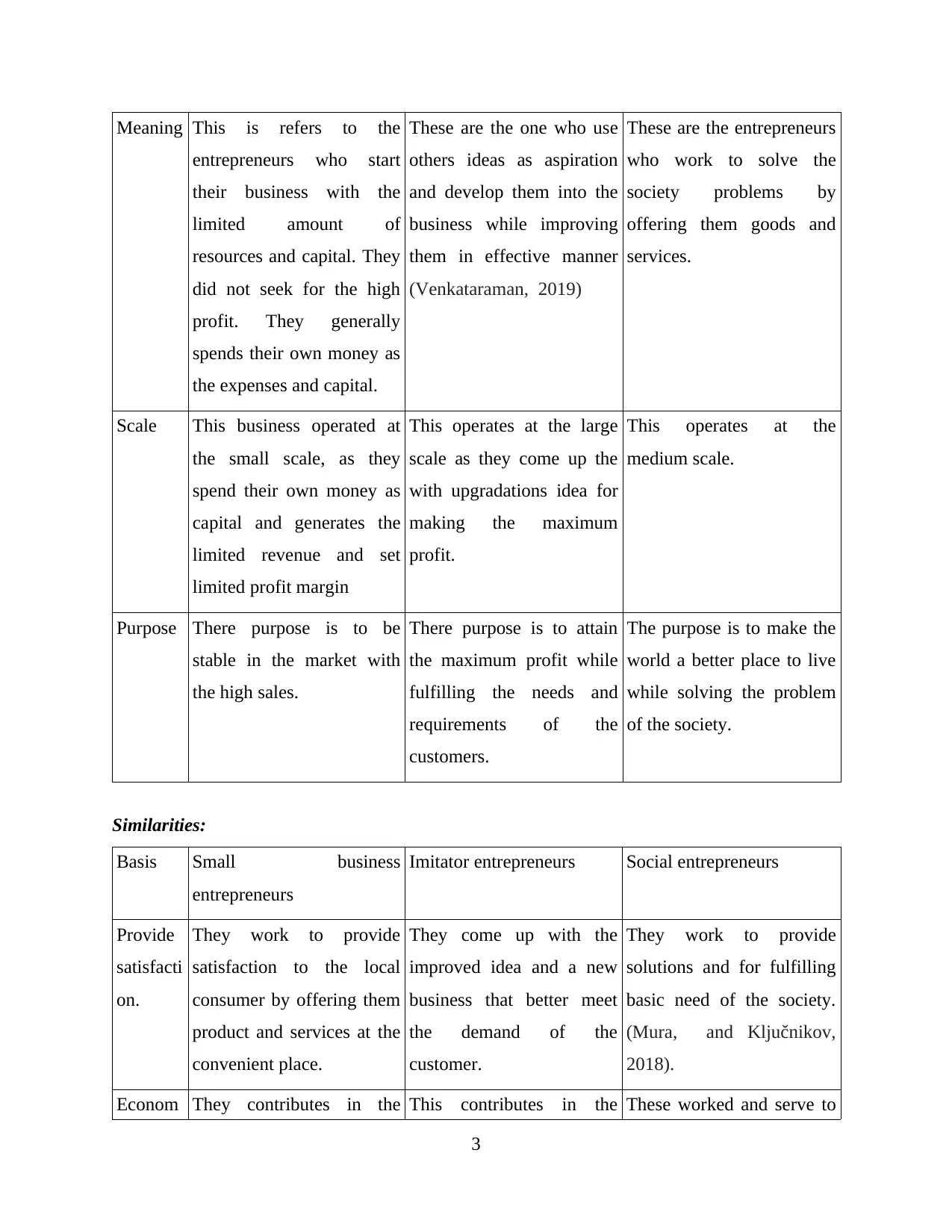
Meaning This is refers to the
entrepreneurs who start
their business with the
limited amount of
resources and capital. They
did not seek for the high
profit. They generally
spends their own money as
the expenses and capital.
These are the one who use
others ideas as aspiration
and develop them into the
business while improving
them in effective manner
(Venkataraman, 2019)
These are the entrepreneurs
who work to solve the
society problems by
offering them goods and
services.
Scale This business operated at
the small scale, as they
spend their own money as
capital and generates the
limited revenue and set
limited profit margin
This operates at the large
scale as they come up the
with upgradations idea for
making the maximum
profit.
This operates at the
medium scale.
Purpose There purpose is to be
stable in the market with
the high sales.
There purpose is to attain
the maximum profit while
fulfilling the needs and
requirements of the
customers.
The purpose is to make the
world a better place to live
while solving the problem
of the society.
Similarities:
Basis Small business
entrepreneurs
Imitator entrepreneurs Social entrepreneurs
Provide
satisfacti
on.
They work to provide
satisfaction to the local
consumer by offering them
product and services at the
convenient place.
They come up with the
improved idea and a new
business that better meet
the demand of the
customer.
They work to provide
solutions and for fulfilling
basic need of the society.
(Mura, and Ključnikov,
2018).
Econom They contributes in the This contributes in the These worked and serve to
3
entrepreneurs who start
their business with the
limited amount of
resources and capital. They
did not seek for the high
profit. They generally
spends their own money as
the expenses and capital.
These are the one who use
others ideas as aspiration
and develop them into the
business while improving
them in effective manner
(Venkataraman, 2019)
These are the entrepreneurs
who work to solve the
society problems by
offering them goods and
services.
Scale This business operated at
the small scale, as they
spend their own money as
capital and generates the
limited revenue and set
limited profit margin
This operates at the large
scale as they come up the
with upgradations idea for
making the maximum
profit.
This operates at the
medium scale.
Purpose There purpose is to be
stable in the market with
the high sales.
There purpose is to attain
the maximum profit while
fulfilling the needs and
requirements of the
customers.
The purpose is to make the
world a better place to live
while solving the problem
of the society.
Similarities:
Basis Small business
entrepreneurs
Imitator entrepreneurs Social entrepreneurs
Provide
satisfacti
on.
They work to provide
satisfaction to the local
consumer by offering them
product and services at the
convenient place.
They come up with the
improved idea and a new
business that better meet
the demand of the
customer.
They work to provide
solutions and for fulfilling
basic need of the society.
(Mura, and Ključnikov,
2018).
Econom They contributes in the This contributes in the These worked and serve to
3
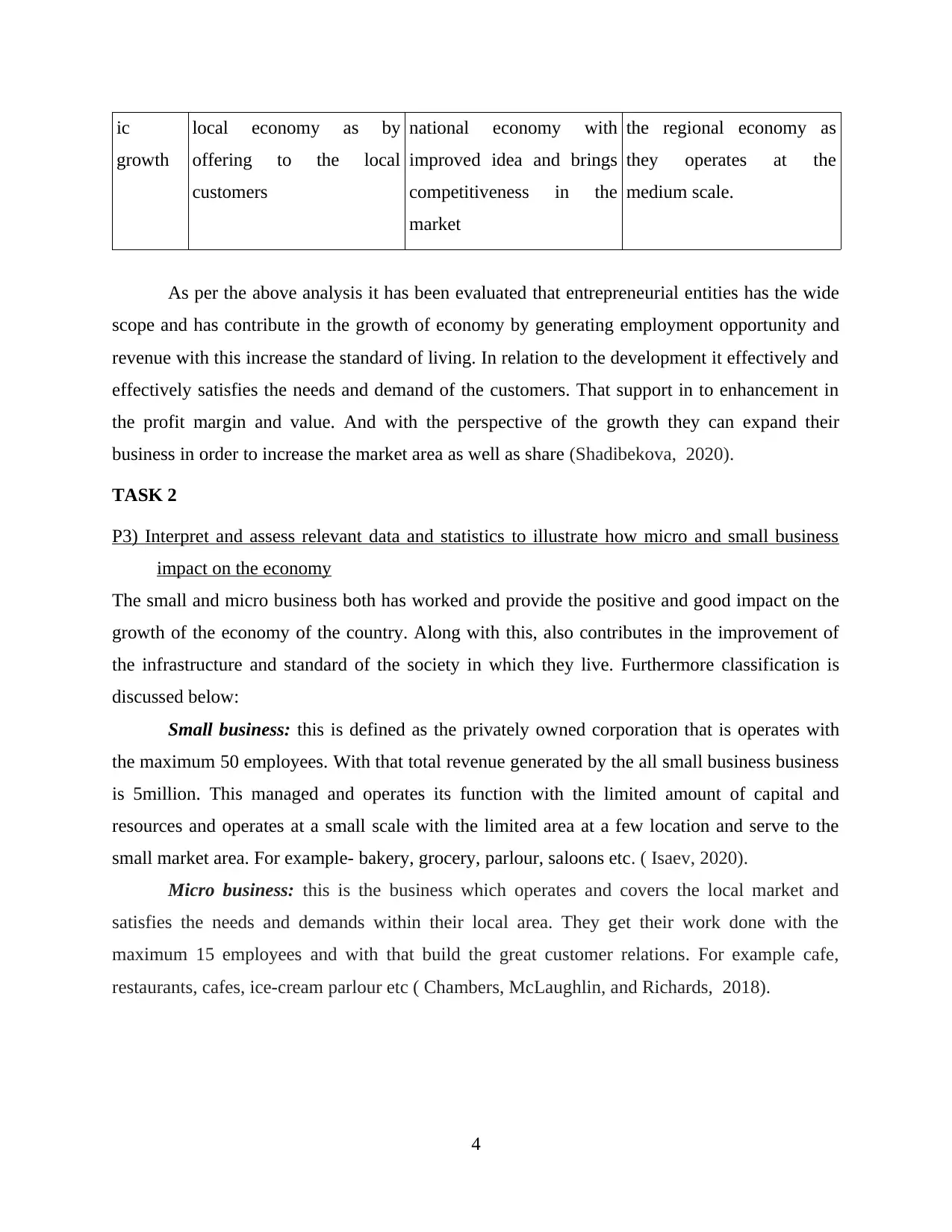
ic
growth
local economy as by
offering to the local
customers
national economy with
improved idea and brings
competitiveness in the
market
the regional economy as
they operates at the
medium scale.
As per the above analysis it has been evaluated that entrepreneurial entities has the wide
scope and has contribute in the growth of economy by generating employment opportunity and
revenue with this increase the standard of living. In relation to the development it effectively and
effectively satisfies the needs and demand of the customers. That support in to enhancement in
the profit margin and value. And with the perspective of the growth they can expand their
business in order to increase the market area as well as share (Shadibekova, 2020).
TASK 2
P3) Interpret and assess relevant data and statistics to illustrate how micro and small business
impact on the economy
The small and micro business both has worked and provide the positive and good impact on the
growth of the economy of the country. Along with this, also contributes in the improvement of
the infrastructure and standard of the society in which they live. Furthermore classification is
discussed below:
Small business: this is defined as the privately owned corporation that is operates with
the maximum 50 employees. With that total revenue generated by the all small business business
is 5million. This managed and operates its function with the limited amount of capital and
resources and operates at a small scale with the limited area at a few location and serve to the
small market area. For example- bakery, grocery, parlour, saloons etc. ( Isaev, 2020).
Micro business: this is the business which operates and covers the local market and
satisfies the needs and demands within their local area. They get their work done with the
maximum 15 employees and with that build the great customer relations. For example cafe,
restaurants, cafes, ice-cream parlour etc ( Chambers, McLaughlin, and Richards, 2018).
4
growth
local economy as by
offering to the local
customers
national economy with
improved idea and brings
competitiveness in the
market
the regional economy as
they operates at the
medium scale.
As per the above analysis it has been evaluated that entrepreneurial entities has the wide
scope and has contribute in the growth of economy by generating employment opportunity and
revenue with this increase the standard of living. In relation to the development it effectively and
effectively satisfies the needs and demand of the customers. That support in to enhancement in
the profit margin and value. And with the perspective of the growth they can expand their
business in order to increase the market area as well as share (Shadibekova, 2020).
TASK 2
P3) Interpret and assess relevant data and statistics to illustrate how micro and small business
impact on the economy
The small and micro business both has worked and provide the positive and good impact on the
growth of the economy of the country. Along with this, also contributes in the improvement of
the infrastructure and standard of the society in which they live. Furthermore classification is
discussed below:
Small business: this is defined as the privately owned corporation that is operates with
the maximum 50 employees. With that total revenue generated by the all small business business
is 5million. This managed and operates its function with the limited amount of capital and
resources and operates at a small scale with the limited area at a few location and serve to the
small market area. For example- bakery, grocery, parlour, saloons etc. ( Isaev, 2020).
Micro business: this is the business which operates and covers the local market and
satisfies the needs and demands within their local area. They get their work done with the
maximum 15 employees and with that build the great customer relations. For example cafe,
restaurants, cafes, ice-cream parlour etc ( Chambers, McLaughlin, and Richards, 2018).
4
⊘ This is a preview!⊘
Do you want full access?
Subscribe today to unlock all pages.

Trusted by 1+ million students worldwide
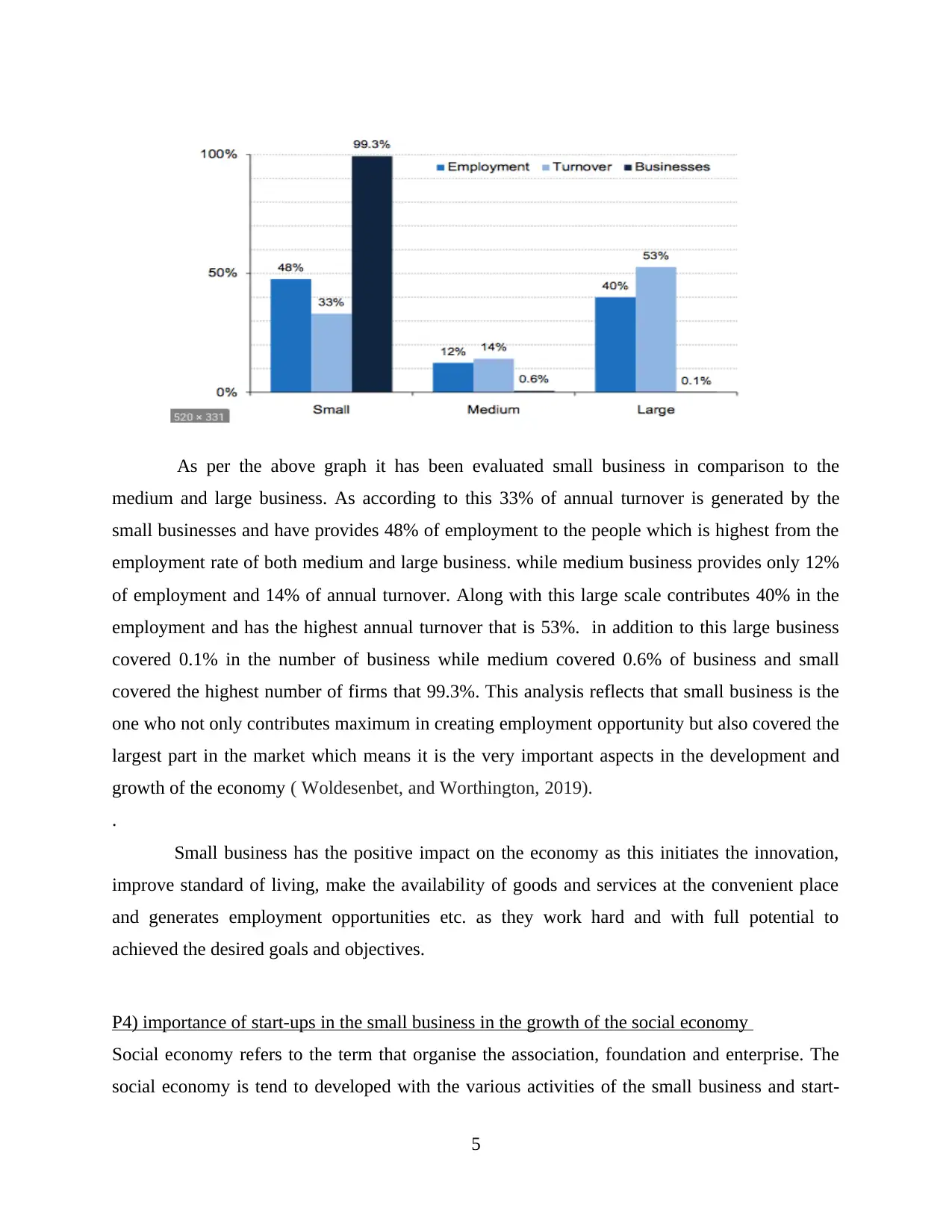
As per the above graph it has been evaluated small business in comparison to the
medium and large business. As according to this 33% of annual turnover is generated by the
small businesses and have provides 48% of employment to the people which is highest from the
employment rate of both medium and large business. while medium business provides only 12%
of employment and 14% of annual turnover. Along with this large scale contributes 40% in the
employment and has the highest annual turnover that is 53%. in addition to this large business
covered 0.1% in the number of business while medium covered 0.6% of business and small
covered the highest number of firms that 99.3%. This analysis reflects that small business is the
one who not only contributes maximum in creating employment opportunity but also covered the
largest part in the market which means it is the very important aspects in the development and
growth of the economy ( Woldesenbet, and Worthington, 2019).
.
Small business has the positive impact on the economy as this initiates the innovation,
improve standard of living, make the availability of goods and services at the convenient place
and generates employment opportunities etc. as they work hard and with full potential to
achieved the desired goals and objectives.
P4) importance of start-ups in the small business in the growth of the social economy
Social economy refers to the term that organise the association, foundation and enterprise. The
social economy is tend to developed with the various activities of the small business and start-
5
medium and large business. As according to this 33% of annual turnover is generated by the
small businesses and have provides 48% of employment to the people which is highest from the
employment rate of both medium and large business. while medium business provides only 12%
of employment and 14% of annual turnover. Along with this large scale contributes 40% in the
employment and has the highest annual turnover that is 53%. in addition to this large business
covered 0.1% in the number of business while medium covered 0.6% of business and small
covered the highest number of firms that 99.3%. This analysis reflects that small business is the
one who not only contributes maximum in creating employment opportunity but also covered the
largest part in the market which means it is the very important aspects in the development and
growth of the economy ( Woldesenbet, and Worthington, 2019).
.
Small business has the positive impact on the economy as this initiates the innovation,
improve standard of living, make the availability of goods and services at the convenient place
and generates employment opportunities etc. as they work hard and with full potential to
achieved the desired goals and objectives.
P4) importance of start-ups in the small business in the growth of the social economy
Social economy refers to the term that organise the association, foundation and enterprise. The
social economy is tend to developed with the various activities of the small business and start-
5
Paraphrase This Document
Need a fresh take? Get an instant paraphrase of this document with our AI Paraphraser
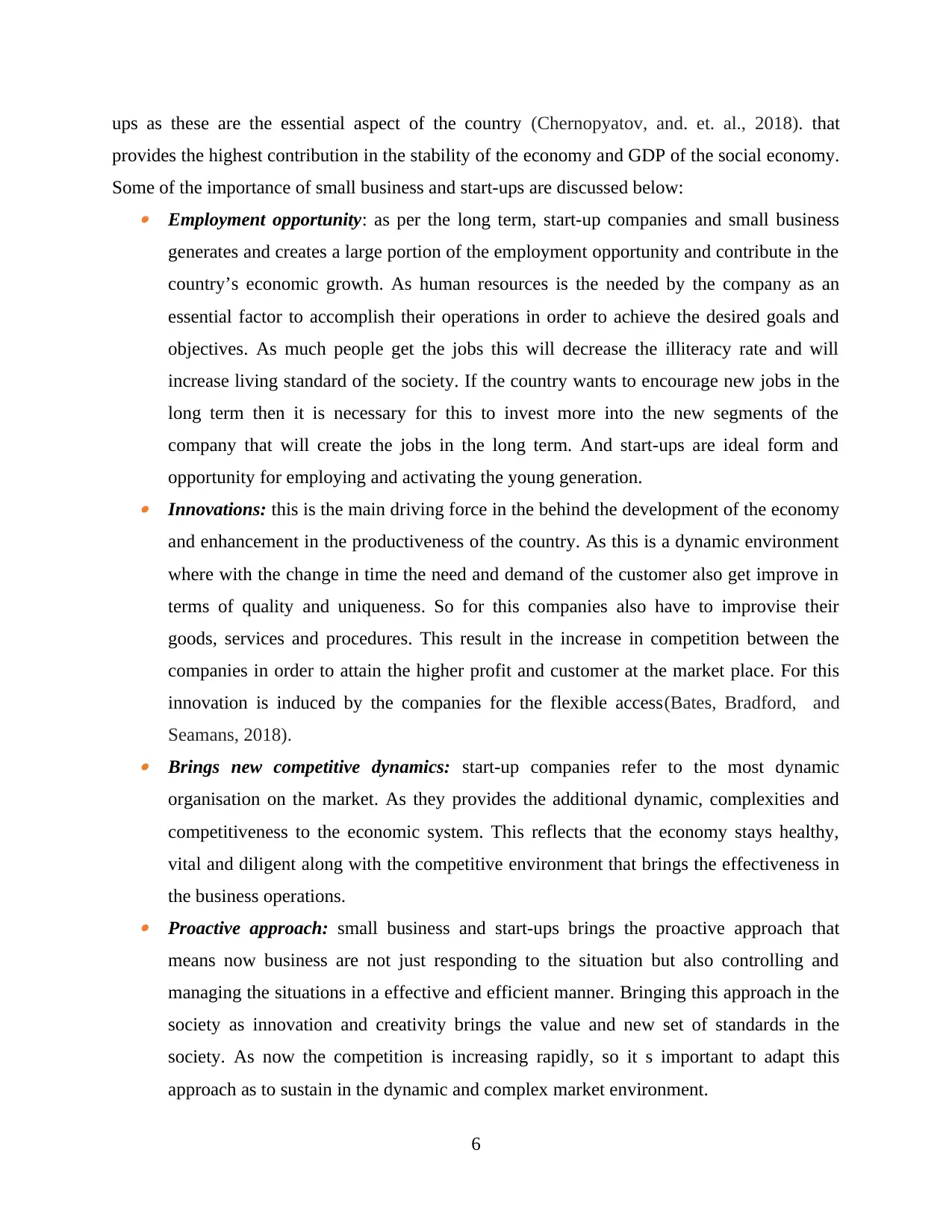
ups as these are the essential aspect of the country (Chernopyatov, and. et. al., 2018). that
provides the highest contribution in the stability of the economy and GDP of the social economy.
Some of the importance of small business and start-ups are discussed below: Employment opportunity: as per the long term, start-up companies and small business
generates and creates a large portion of the employment opportunity and contribute in the
country’s economic growth. As human resources is the needed by the company as an
essential factor to accomplish their operations in order to achieve the desired goals and
objectives. As much people get the jobs this will decrease the illiteracy rate and will
increase living standard of the society. If the country wants to encourage new jobs in the
long term then it is necessary for this to invest more into the new segments of the
company that will create the jobs in the long term. And start-ups are ideal form and
opportunity for employing and activating the young generation. Innovations: this is the main driving force in the behind the development of the economy
and enhancement in the productiveness of the country. As this is a dynamic environment
where with the change in time the need and demand of the customer also get improve in
terms of quality and uniqueness. So for this companies also have to improvise their
goods, services and procedures. This result in the increase in competition between the
companies in order to attain the higher profit and customer at the market place. For this
innovation is induced by the companies for the flexible access(Bates, Bradford, and
Seamans, 2018). Brings new competitive dynamics: start-up companies refer to the most dynamic
organisation on the market. As they provides the additional dynamic, complexities and
competitiveness to the economic system. This reflects that the economy stays healthy,
vital and diligent along with the competitive environment that brings the effectiveness in
the business operations. Proactive approach: small business and start-ups brings the proactive approach that
means now business are not just responding to the situation but also controlling and
managing the situations in a effective and efficient manner. Bringing this approach in the
society as innovation and creativity brings the value and new set of standards in the
society. As now the competition is increasing rapidly, so it s important to adapt this
approach as to sustain in the dynamic and complex market environment.
6
provides the highest contribution in the stability of the economy and GDP of the social economy.
Some of the importance of small business and start-ups are discussed below: Employment opportunity: as per the long term, start-up companies and small business
generates and creates a large portion of the employment opportunity and contribute in the
country’s economic growth. As human resources is the needed by the company as an
essential factor to accomplish their operations in order to achieve the desired goals and
objectives. As much people get the jobs this will decrease the illiteracy rate and will
increase living standard of the society. If the country wants to encourage new jobs in the
long term then it is necessary for this to invest more into the new segments of the
company that will create the jobs in the long term. And start-ups are ideal form and
opportunity for employing and activating the young generation. Innovations: this is the main driving force in the behind the development of the economy
and enhancement in the productiveness of the country. As this is a dynamic environment
where with the change in time the need and demand of the customer also get improve in
terms of quality and uniqueness. So for this companies also have to improvise their
goods, services and procedures. This result in the increase in competition between the
companies in order to attain the higher profit and customer at the market place. For this
innovation is induced by the companies for the flexible access(Bates, Bradford, and
Seamans, 2018). Brings new competitive dynamics: start-up companies refer to the most dynamic
organisation on the market. As they provides the additional dynamic, complexities and
competitiveness to the economic system. This reflects that the economy stays healthy,
vital and diligent along with the competitive environment that brings the effectiveness in
the business operations. Proactive approach: small business and start-ups brings the proactive approach that
means now business are not just responding to the situation but also controlling and
managing the situations in a effective and efficient manner. Bringing this approach in the
society as innovation and creativity brings the value and new set of standards in the
society. As now the competition is increasing rapidly, so it s important to adapt this
approach as to sustain in the dynamic and complex market environment.
6
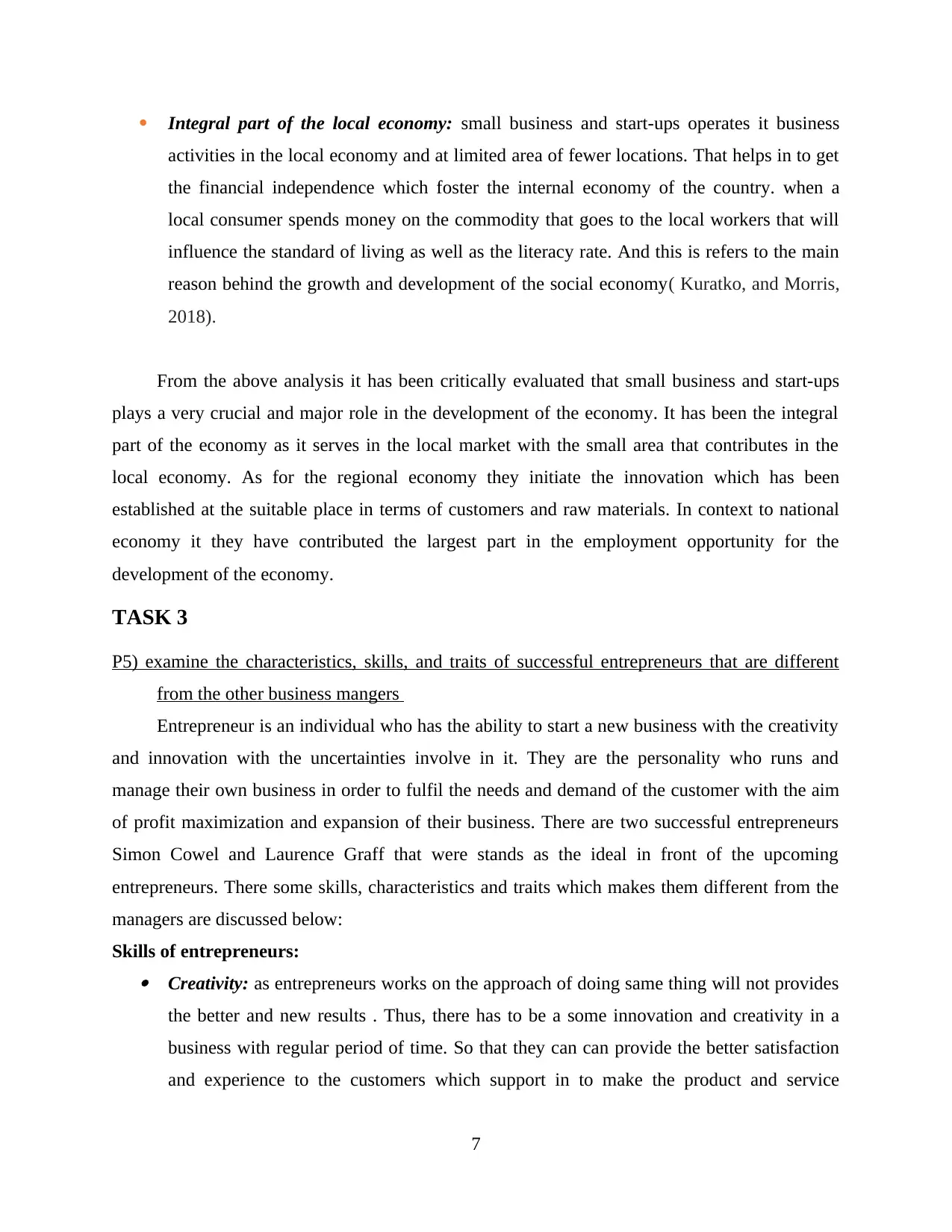
Integral part of the local economy: small business and start-ups operates it business
activities in the local economy and at limited area of fewer locations. That helps in to get
the financial independence which foster the internal economy of the country. when a
local consumer spends money on the commodity that goes to the local workers that will
influence the standard of living as well as the literacy rate. And this is refers to the main
reason behind the growth and development of the social economy( Kuratko, and Morris,
2018).
From the above analysis it has been critically evaluated that small business and start-ups
plays a very crucial and major role in the development of the economy. It has been the integral
part of the economy as it serves in the local market with the small area that contributes in the
local economy. As for the regional economy they initiate the innovation which has been
established at the suitable place in terms of customers and raw materials. In context to national
economy it they have contributed the largest part in the employment opportunity for the
development of the economy.
TASK 3
P5) examine the characteristics, skills, and traits of successful entrepreneurs that are different
from the other business mangers
Entrepreneur is an individual who has the ability to start a new business with the creativity
and innovation with the uncertainties involve in it. They are the personality who runs and
manage their own business in order to fulfil the needs and demand of the customer with the aim
of profit maximization and expansion of their business. There are two successful entrepreneurs
Simon Cowel and Laurence Graff that were stands as the ideal in front of the upcoming
entrepreneurs. There some skills, characteristics and traits which makes them different from the
managers are discussed below:
Skills of entrepreneurs: Creativity: as entrepreneurs works on the approach of doing same thing will not provides
the better and new results . Thus, there has to be a some innovation and creativity in a
business with regular period of time. So that they can can provide the better satisfaction
and experience to the customers which support in to make the product and service
7
activities in the local economy and at limited area of fewer locations. That helps in to get
the financial independence which foster the internal economy of the country. when a
local consumer spends money on the commodity that goes to the local workers that will
influence the standard of living as well as the literacy rate. And this is refers to the main
reason behind the growth and development of the social economy( Kuratko, and Morris,
2018).
From the above analysis it has been critically evaluated that small business and start-ups
plays a very crucial and major role in the development of the economy. It has been the integral
part of the economy as it serves in the local market with the small area that contributes in the
local economy. As for the regional economy they initiate the innovation which has been
established at the suitable place in terms of customers and raw materials. In context to national
economy it they have contributed the largest part in the employment opportunity for the
development of the economy.
TASK 3
P5) examine the characteristics, skills, and traits of successful entrepreneurs that are different
from the other business mangers
Entrepreneur is an individual who has the ability to start a new business with the creativity
and innovation with the uncertainties involve in it. They are the personality who runs and
manage their own business in order to fulfil the needs and demand of the customer with the aim
of profit maximization and expansion of their business. There are two successful entrepreneurs
Simon Cowel and Laurence Graff that were stands as the ideal in front of the upcoming
entrepreneurs. There some skills, characteristics and traits which makes them different from the
managers are discussed below:
Skills of entrepreneurs: Creativity: as entrepreneurs works on the approach of doing same thing will not provides
the better and new results . Thus, there has to be a some innovation and creativity in a
business with regular period of time. So that they can can provide the better satisfaction
and experience to the customers which support in to make the product and service
7
⊘ This is a preview!⊘
Do you want full access?
Subscribe today to unlock all pages.

Trusted by 1+ million students worldwide
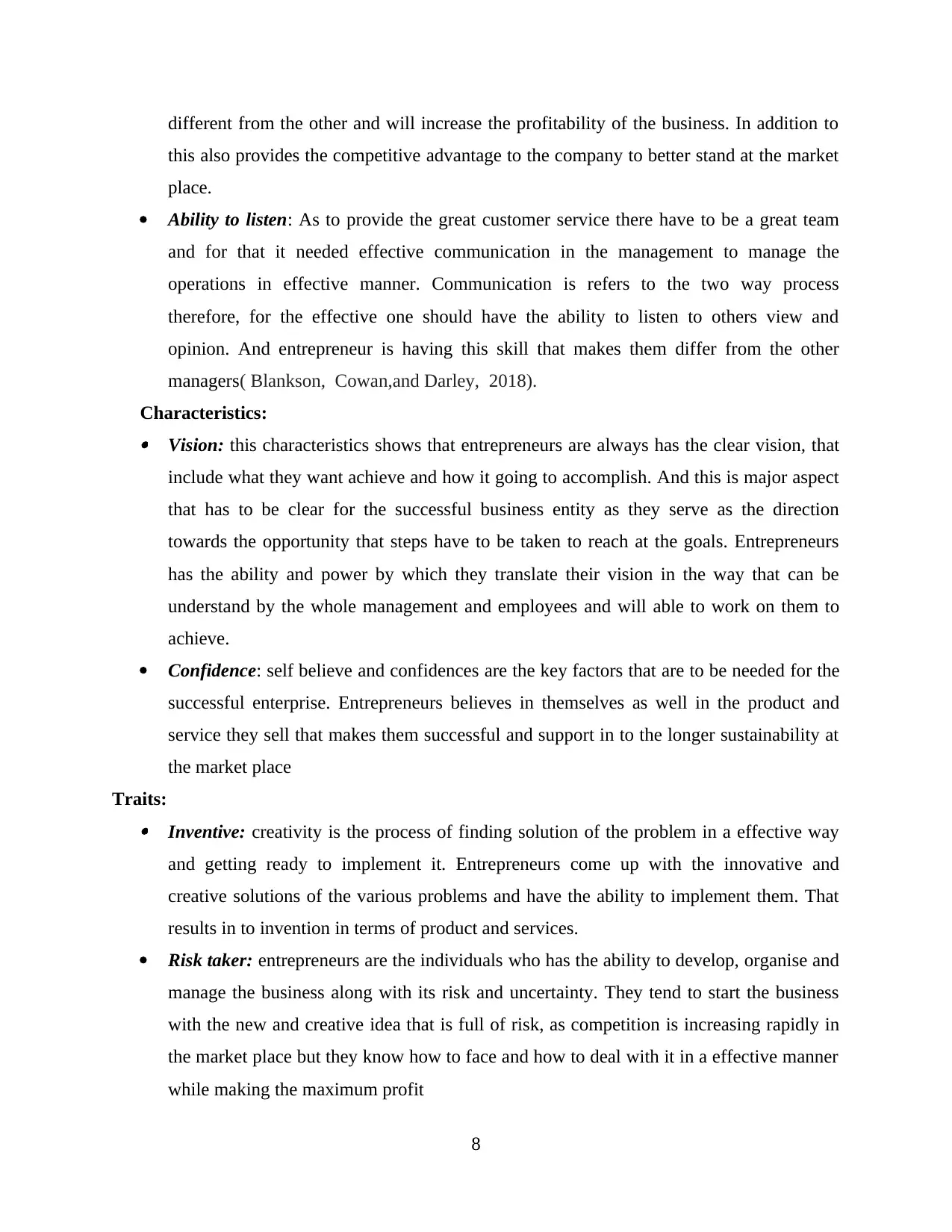
different from the other and will increase the profitability of the business. In addition to
this also provides the competitive advantage to the company to better stand at the market
place.
Ability to listen: As to provide the great customer service there have to be a great team
and for that it needed effective communication in the management to manage the
operations in effective manner. Communication is refers to the two way process
therefore, for the effective one should have the ability to listen to others view and
opinion. And entrepreneur is having this skill that makes them differ from the other
managers( Blankson, Cowan,and Darley, 2018).
Characteristics: Vision: this characteristics shows that entrepreneurs are always has the clear vision, that
include what they want achieve and how it going to accomplish. And this is major aspect
that has to be clear for the successful business entity as they serve as the direction
towards the opportunity that steps have to be taken to reach at the goals. Entrepreneurs
has the ability and power by which they translate their vision in the way that can be
understand by the whole management and employees and will able to work on them to
achieve.
Confidence: self believe and confidences are the key factors that are to be needed for the
successful enterprise. Entrepreneurs believes in themselves as well in the product and
service they sell that makes them successful and support in to the longer sustainability at
the market place
Traits: Inventive: creativity is the process of finding solution of the problem in a effective way
and getting ready to implement it. Entrepreneurs come up with the innovative and
creative solutions of the various problems and have the ability to implement them. That
results in to invention in terms of product and services.
Risk taker: entrepreneurs are the individuals who has the ability to develop, organise and
manage the business along with its risk and uncertainty. They tend to start the business
with the new and creative idea that is full of risk, as competition is increasing rapidly in
the market place but they know how to face and how to deal with it in a effective manner
while making the maximum profit
8
this also provides the competitive advantage to the company to better stand at the market
place.
Ability to listen: As to provide the great customer service there have to be a great team
and for that it needed effective communication in the management to manage the
operations in effective manner. Communication is refers to the two way process
therefore, for the effective one should have the ability to listen to others view and
opinion. And entrepreneur is having this skill that makes them differ from the other
managers( Blankson, Cowan,and Darley, 2018).
Characteristics: Vision: this characteristics shows that entrepreneurs are always has the clear vision, that
include what they want achieve and how it going to accomplish. And this is major aspect
that has to be clear for the successful business entity as they serve as the direction
towards the opportunity that steps have to be taken to reach at the goals. Entrepreneurs
has the ability and power by which they translate their vision in the way that can be
understand by the whole management and employees and will able to work on them to
achieve.
Confidence: self believe and confidences are the key factors that are to be needed for the
successful enterprise. Entrepreneurs believes in themselves as well in the product and
service they sell that makes them successful and support in to the longer sustainability at
the market place
Traits: Inventive: creativity is the process of finding solution of the problem in a effective way
and getting ready to implement it. Entrepreneurs come up with the innovative and
creative solutions of the various problems and have the ability to implement them. That
results in to invention in terms of product and services.
Risk taker: entrepreneurs are the individuals who has the ability to develop, organise and
manage the business along with its risk and uncertainty. They tend to start the business
with the new and creative idea that is full of risk, as competition is increasing rapidly in
the market place but they know how to face and how to deal with it in a effective manner
while making the maximum profit
8
Paraphrase This Document
Need a fresh take? Get an instant paraphrase of this document with our AI Paraphraser
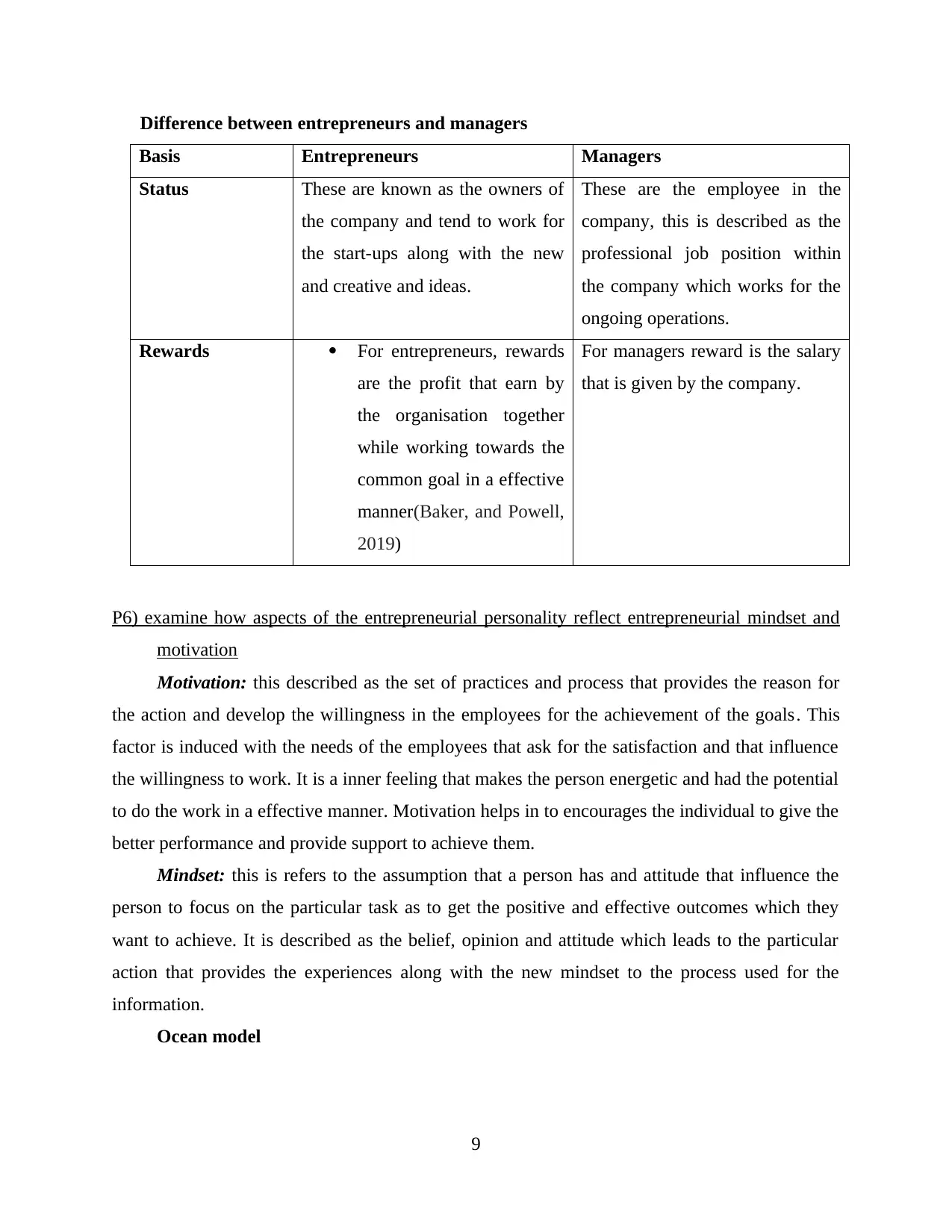
Difference between entrepreneurs and managers
Basis Entrepreneurs Managers
Status These are known as the owners of
the company and tend to work for
the start-ups along with the new
and creative and ideas.
These are the employee in the
company, this is described as the
professional job position within
the company which works for the
ongoing operations.
Rewards For entrepreneurs, rewards
are the profit that earn by
the organisation together
while working towards the
common goal in a effective
manner(Baker, and Powell,
2019)
For managers reward is the salary
that is given by the company.
P6) examine how aspects of the entrepreneurial personality reflect entrepreneurial mindset and
motivation
Motivation: this described as the set of practices and process that provides the reason for
the action and develop the willingness in the employees for the achievement of the goals. This
factor is induced with the needs of the employees that ask for the satisfaction and that influence
the willingness to work. It is a inner feeling that makes the person energetic and had the potential
to do the work in a effective manner. Motivation helps in to encourages the individual to give the
better performance and provide support to achieve them.
Mindset: this is refers to the assumption that a person has and attitude that influence the
person to focus on the particular task as to get the positive and effective outcomes which they
want to achieve. It is described as the belief, opinion and attitude which leads to the particular
action that provides the experiences along with the new mindset to the process used for the
information.
Ocean model
9
Basis Entrepreneurs Managers
Status These are known as the owners of
the company and tend to work for
the start-ups along with the new
and creative and ideas.
These are the employee in the
company, this is described as the
professional job position within
the company which works for the
ongoing operations.
Rewards For entrepreneurs, rewards
are the profit that earn by
the organisation together
while working towards the
common goal in a effective
manner(Baker, and Powell,
2019)
For managers reward is the salary
that is given by the company.
P6) examine how aspects of the entrepreneurial personality reflect entrepreneurial mindset and
motivation
Motivation: this described as the set of practices and process that provides the reason for
the action and develop the willingness in the employees for the achievement of the goals. This
factor is induced with the needs of the employees that ask for the satisfaction and that influence
the willingness to work. It is a inner feeling that makes the person energetic and had the potential
to do the work in a effective manner. Motivation helps in to encourages the individual to give the
better performance and provide support to achieve them.
Mindset: this is refers to the assumption that a person has and attitude that influence the
person to focus on the particular task as to get the positive and effective outcomes which they
want to achieve. It is described as the belief, opinion and attitude which leads to the particular
action that provides the experiences along with the new mindset to the process used for the
information.
Ocean model
9
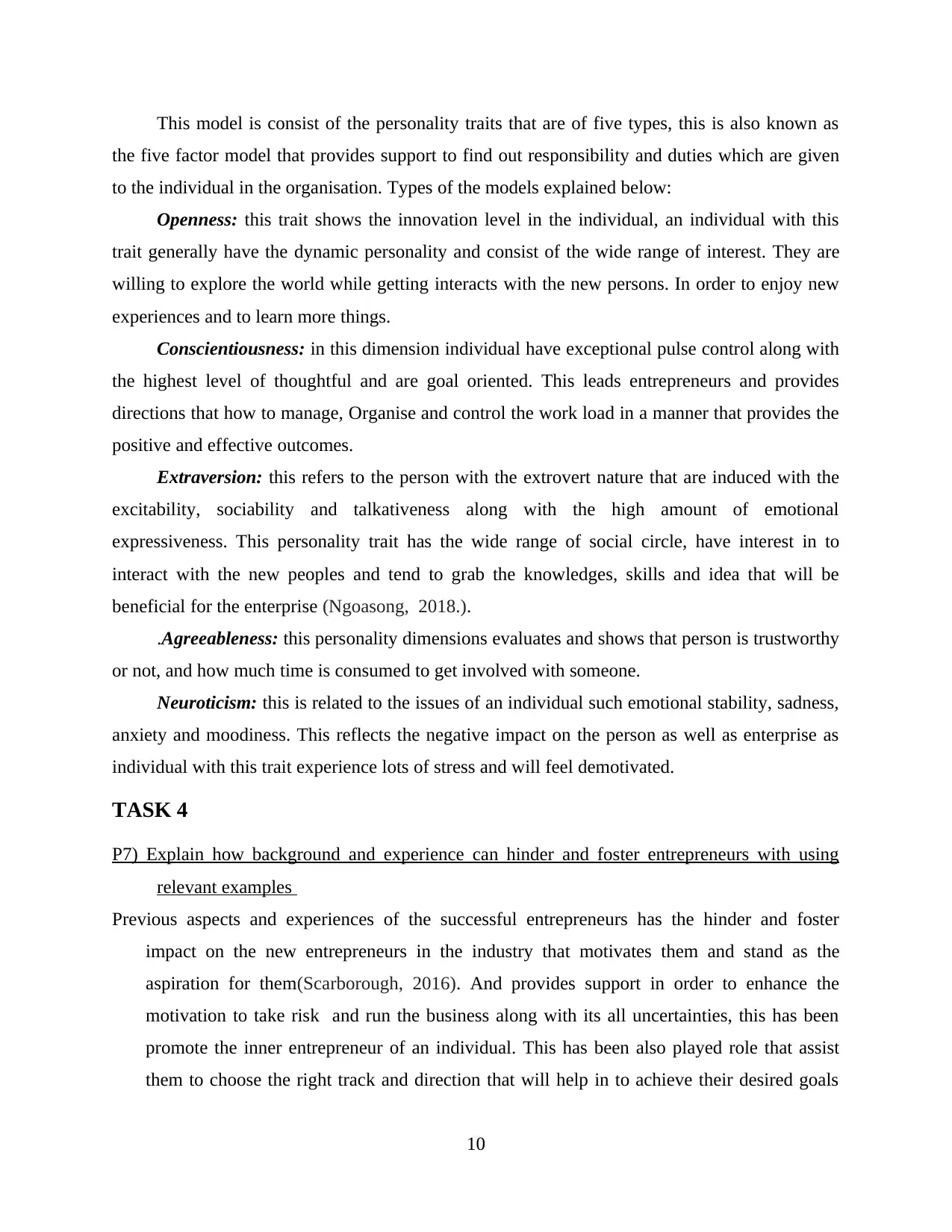
This model is consist of the personality traits that are of five types, this is also known as
the five factor model that provides support to find out responsibility and duties which are given
to the individual in the organisation. Types of the models explained below:
Openness: this trait shows the innovation level in the individual, an individual with this
trait generally have the dynamic personality and consist of the wide range of interest. They are
willing to explore the world while getting interacts with the new persons. In order to enjoy new
experiences and to learn more things.
Conscientiousness: in this dimension individual have exceptional pulse control along with
the highest level of thoughtful and are goal oriented. This leads entrepreneurs and provides
directions that how to manage, Organise and control the work load in a manner that provides the
positive and effective outcomes.
Extraversion: this refers to the person with the extrovert nature that are induced with the
excitability, sociability and talkativeness along with the high amount of emotional
expressiveness. This personality trait has the wide range of social circle, have interest in to
interact with the new peoples and tend to grab the knowledges, skills and idea that will be
beneficial for the enterprise (Ngoasong, 2018.).
.Agreeableness: this personality dimensions evaluates and shows that person is trustworthy
or not, and how much time is consumed to get involved with someone.
Neuroticism: this is related to the issues of an individual such emotional stability, sadness,
anxiety and moodiness. This reflects the negative impact on the person as well as enterprise as
individual with this trait experience lots of stress and will feel demotivated.
TASK 4
P7) Explain how background and experience can hinder and foster entrepreneurs with using
relevant examples
Previous aspects and experiences of the successful entrepreneurs has the hinder and foster
impact on the new entrepreneurs in the industry that motivates them and stand as the
aspiration for them(Scarborough, 2016). And provides support in order to enhance the
motivation to take risk and run the business along with its all uncertainties, this has been
promote the inner entrepreneur of an individual. This has been also played role that assist
them to choose the right track and direction that will help in to achieve their desired goals
10
the five factor model that provides support to find out responsibility and duties which are given
to the individual in the organisation. Types of the models explained below:
Openness: this trait shows the innovation level in the individual, an individual with this
trait generally have the dynamic personality and consist of the wide range of interest. They are
willing to explore the world while getting interacts with the new persons. In order to enjoy new
experiences and to learn more things.
Conscientiousness: in this dimension individual have exceptional pulse control along with
the highest level of thoughtful and are goal oriented. This leads entrepreneurs and provides
directions that how to manage, Organise and control the work load in a manner that provides the
positive and effective outcomes.
Extraversion: this refers to the person with the extrovert nature that are induced with the
excitability, sociability and talkativeness along with the high amount of emotional
expressiveness. This personality trait has the wide range of social circle, have interest in to
interact with the new peoples and tend to grab the knowledges, skills and idea that will be
beneficial for the enterprise (Ngoasong, 2018.).
.Agreeableness: this personality dimensions evaluates and shows that person is trustworthy
or not, and how much time is consumed to get involved with someone.
Neuroticism: this is related to the issues of an individual such emotional stability, sadness,
anxiety and moodiness. This reflects the negative impact on the person as well as enterprise as
individual with this trait experience lots of stress and will feel demotivated.
TASK 4
P7) Explain how background and experience can hinder and foster entrepreneurs with using
relevant examples
Previous aspects and experiences of the successful entrepreneurs has the hinder and foster
impact on the new entrepreneurs in the industry that motivates them and stand as the
aspiration for them(Scarborough, 2016). And provides support in order to enhance the
motivation to take risk and run the business along with its all uncertainties, this has been
promote the inner entrepreneur of an individual. This has been also played role that assist
them to choose the right track and direction that will help in to achieve their desired goals
10
⊘ This is a preview!⊘
Do you want full access?
Subscribe today to unlock all pages.

Trusted by 1+ million students worldwide
1 out of 16
Related Documents
Your All-in-One AI-Powered Toolkit for Academic Success.
+13062052269
info@desklib.com
Available 24*7 on WhatsApp / Email
![[object Object]](/_next/static/media/star-bottom.7253800d.svg)
Unlock your academic potential
Copyright © 2020–2026 A2Z Services. All Rights Reserved. Developed and managed by ZUCOL.





